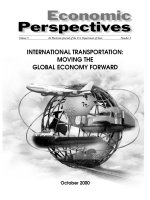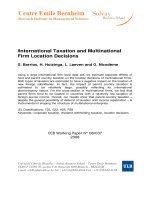International taxation handbook
Bạn đang xem bản rút gọn của tài liệu. Xem và tải ngay bản đầy đủ của tài liệu tại đây (1.66 MB, 390 trang )
International Taxation
Handbook
This page intentionally left blank
International Taxation
Handbook
Policy, Practice, Standards, and
Regulation
Edited by
Colin Read
and
Greg N. Gregoriou
AMSTERDAM • BOSTON • HEIDELBERG • LONDON • NEW YORK • OXFORD
PARIS • SAN DIEGO • SAN FRANCISCO • SINGAPORE • SYDNEY • TOKYO
CIMA Publishing is an imprint of Elsevier
CIMA Publishing is an imprint of Elsevier
Linacre House, Jordan Hill, Oxford OX2 8DP
30 Corporate Drive, Suite 400, Burlington, MA 01803, USA
First edition 2007
Copyright © 2007, Elsevier Ltd, except Chapter 8 Copyright © European Communities
2006. All rights reserved.
No part of this publication may be reproduced, stored in a retrieval system or
transmitted in any form or by any means electronic, mechanical, photocopying,
recording or otherwise without the prior written permission of the publisher
Permissions may be sought directly from Elsevier’s Science & Technology Rights
Department in Oxford, UK: phone (+44) (0) 1865 843830; fax (+44) (0) 1865 853333;
email: Alternatively you can submit your request online by
visiting the Elsevier web site at and selecting
Obtaining permission to use Elsevier material
Notice
No responsibility is assumed by the publisher for any injury and/or damage to persons or
property as a matter of products’ liability, negligence or otherwise, or from any use or
operation of any methods, products, instructions or ideas contained in the material
herein.
British Library Cataloguing in Publication Data
A catalogue record for this book is available from the British Library
Library of Congress Cataloguing in Publication Data
A catalogue record for this book is available from the Library of Congress
ISBN–13: 978-0-7506-8371-5
ISBN–10: 0-7506-8371-6
For information on all CIMA Publishing publications
visit our web site at
Typeset in 10/14 pts Melior by Charon Tec Ltd (A Macmillan Company), Chennai, India
www.charontec.com
Printed and bound in The Netherlands
07 08 09 10 11
10 9 8 7 6 5 4 3 2 1
Contents
About the editors
About the contributors
xiii
xv
Part 1 International Taxation Theory
1
1 The Evolution of International Taxation
Colin Read
3
1.1 Introduction
2 Summary, Description, and Extensions of the Capital Income
Effective Tax Rate Literature
Fernando M.M. Ruiz and Marcel Gérard
2.1 Introduction
2.2 Forward-looking ETRs
2.2.1 The cost of capital
2.2.2 Marginal ETR
2.2.3 A simple extension to the marginal effective tax
2.2.4 Average ETR
2.2.5 An extension to the EATR with uncertainty and the
entrance of rival firms
2.3 Backward-looking ETRs
2.3.1 Average ETR
2.3.2 Marginal ETR
2.4 The cost of production approach
2.4.1 Marginal ETRC
2.4.2 Average ETRC
2.5 Conclusion: Advantages and disadvantages of using various ETRs
Acknowledgments
Notes
References
Appendix A
Appendix B
5
11
13
14
14
17
20
22
24
28
28
30
31
31
34
35
36
36
38
39
40
v
Contents
3 Empirical Models of International Capital-tax Competition
Robert J. Franzese Jr and Jude C. Hays
3.1
3.2
3.3
3.4
Introduction
Globalization, tax competition, and convergence
A stylized theoretical model of capital-tax competition
Econometric issues in estimating C&IPE empirical models from
spatially interdependent data
3.5 Spatial-lag empirical models of capital-tax competition
3.6 Conclusion
Acknowledgments
Notes
References
4 Labor Mobility and Income Tax Competition
Gwenaël Piaser
4.1 Introduction
4.2 Model
4.2.1 Workers
4.2.2 Governments
4.3 Autarky
4.4 Rawlsian governments
4.5 Quasi-utilitarian criterion
4.6 Conclusion
Acknowledgments
Notes
References
Appendix A: Proof of Proposition 1
Appendix B: Proof of Proposition 2
Appendix C: Proof of Corollaries 1 and 2
Appendix D: Proof of Proposition 3
Part 2 Optimal International Taxation in Practice –
Innovations and the EU
5 Taxable Asset Sales in Securitization
Paul U. Ali
5.1 Introduction
5.2 Cash securitizations
vi
43
45
46
50
53
60
67
68
68
70
73
75
77
77
78
79
80
86
88
89
89
89
90
90
92
92
95
97
99
100
Contents
5.3 Bankruptcy remoteness of the securitization vehicle
5.4 True sale of the securitized assets
5.5 True sales and legal assignments
5.6 True sales and equitable assignments
5.7 Replenishment
5.8 Substitution
5.9 Conclusion
References
6 Globalization, Multinationals, and Tax Base Allocation:
Advance Pricing Agreements as Shifts in International Taxation?
Markus Brem and Thomas Tucha
6.1 Introduction
6.2 Transfer pricing and APAs
6.2.1 Transfer pricing and MNCs
6.2.2 Identifying the tax base
6.2.3 The role of APAs in taxing multinationals
6.3 From bureaucracy to nonadversarial coordination
6.3.1 Public bureaucracies: Governance choice
6.3.2 Taxation: Unilateral asymmetric information
6.3.3 Taxing multinationals: Two-sided asymmetric
information
6.3.4 APA as alternative mode for identifying and allocating
the tax base
6.3.5 Factors explaining the use of APAs
6.4 Conclusion
Acknowledgments
Notes
References
7 Documentation of Transfer Pricing: The Nature of
Arm’s Length Analysis
Thomas Tucha and Markus Brem
7.1 Introduction
7.2 Company types
7.2.1 Companies with routine functions
7.2.2 Entrepreneur as strategy unit
7.2.3 Hybrid units
101
101
104
106
107
107
109
110
111
113
114
114
116
117
125
125
129
130
132
133
140
141
142
143
147
149
154
154
154
155
vii
Contents
7.3 Between routine risk and high uncertainty
7.3.1 Traditional terminology
7.3.2 Distinction between risk and uncertainty
7.3.3 Intermediary results
7.4 Classification of companies
7.4.1 Function and risk analysis in the broader sense
7.4.2 Selection of the type of arm’s length analysis
7.4.3 Functional type: Risk versus uncertainty
7.4.4 Functional density: Comparability versus uniqueness
7.5 Arm’s length analysis
7.5.1 ‘Routine company’ and third-party comparison
7.5.2 ‘Hybrids’, budget planning, and budget-actual
assessment
7.5.3 ‘Entrepreneur’ and allocation of residuals
7.6 Conclusion
Acknowledgments
Notes
References
8 Corporate Tax Competition and Coordination in the
European Union: What Do We Know? Where Do We Stand?
Gaëtan Nicodème
8.1
8.2
8.3
8.4
8.5
Introduction
The European Union as a global power
The institutional design of and rationale for taxation
The evolution of tax receipts in the European Union
Corporate tax competition in the European Union: Theory
and empirical evidence
8.5.1 Tax competition and the underprovision of public goods
8.5.2 What do theories of tax competition tell us?
8.5.3 How well does the European Union fit the theory?
8.5.4 Do European Member States compete on tax rates?
8.6 The corporate taxation debate in the European Union:
The early proposals
8.7 The corporate taxation debate in the European Union:
The 2001 Communication
8.7.1 Comprehensive and targeted solutions
8.7.2 Cross-border loss relief in the European Union
viii
156
156
156
158
159
160
161
161
163
163
163
164
165
166
167
167
168
171
173
173
174
178
179
179
181
182
184
187
188
189
190
Contents
8.7.3 Transfer pricing and profit shifting in the European Union
8.7.4 How should the comprehensive solutions be
implemented?
8.8 What are the gains from coordination?
8.9 Conclusion
Acknowledgments
Notes
References
9 Corporate Taxation in Europe: Competitive Pressure and
Cooperative Targets
Carlo Garbarino and Paolo M. Panteghini
9.1
9.2
9.3
9.4
Introduction
The push towards tax competition in the EU
Tax coordination ‘from the top’ in the EU
Tax coordination from the bottom: Evolution of
EU corporate tax models
9.4.1 The first level: Basic tax problems
9.4.2 The second level: The emergence of tax models
9.4.3 The third level: From tax models to domestic
tax mechanisms
9.5 Tax coordination from the bottom: Convergence and
circulation of tax models
9.6 Coordination from the top and from the bottom: A feasible
meeting point
9.7 Conclusion
Acknowledgments
Notes
References
192
194
196
198
199
200
202
209
211
212
215
219
220
220
223
224
232
233
234
234
236
10 The Economics of Taxing Cross-border Savings Income:
An Application to the EU Savings Tax
Jenny E. Ligthart
239
10.1 Introduction
10.2 General principles of information sharing
10.2.1 The fundamental need for information
10.2.2 Basic principles of information sharing
241
243
243
244
ix
Contents
10.3 The theoretical literature
10.3.1 Reasons for information sharing
10.3.2 Outside tax havens
10.3.3 Alternative instruments
10.4 The EU savings tax
10.4.1 Brief historical background
10.4.2 General principles
10.4.3 Effectiveness of the EU savings tax
10.5 Conclusion
Notes
References
11 Tax Misery and Tax Happiness: A Comparative Study of
Selected Asian Countries
Robert W. McGee
11.1 Introduction
11.2 Tax misery
11.3 Tax reform
11.4 Happiness Index
11.5 Country analysis
11.6 Index of Economic Freedom
11.7 Conclusion
References
Part 3 Global Challenges and Global Innovations
12 The Ethics of Tax Evasion: Lessons for Transitional
Economies
Irina Nasadyuk and Robert W. McGee
12.1 Introduction
12.2 Review of the literature
12.3 Methodology
12.4 Findings
12.5 Conclusion
Acknowledgments
References
x
245
245
248
249
251
251
253
257
261
262
264
267
269
270
274
274
280
282
287
287
289
291
293
293
297
298
305
306
306
Contents
13 Money Laundering: Every Financial Transaction Leaves a
Paper Trail
Greg N. Gregoriou, Gino Vita, and Paul U. Ali
13.1 Introduction
13.2 The authorities are on the lookout
13.3 Directions
13.4 Techniques
13.5 Eyes wide open
13.6 Tightly closed eyes
13.7 The ‘John Doe’ method
13.8 Conclusion: Big Brother is watching
References
14 Tax Effects in the Valuation of Multinational Corporations:
The Brazilian Experience
César Augusto Tibúrcio Silva, Jorge Katsumi Niyama,
José Antônio de França, and Leonardo Vieira
14.1
14.2
14.3
14.4
14.5
Introduction
Discounted cash flow
Juros sobre capital próprio
Tax benefits for rural activities (agribusiness)
Tax credits from commodities imports and royalty
payments
14.6 Conclusion
Notes
References
15 The Economic Impacts of Trade Agreements and Tax Reforms in
Brazil: Some Implications for Accounting Research
Alexandre B. Cunha, Alexsandro Broedel Lopes, and
Arilton Teixeira
15.1 Introduction
15.2 The economy
15.2.1 Preferences
15.2.2 Technologies
15.2.3 Government consumption and taxes
311
313
315
316
317
319
320
320
321
322
323
325
327
329
332
334
336
336
336
339
341
343
344
344
345
xi
Contents
15.3 Competitive equilibrium
15.4 The experiments
15.5 Conclusion: Implications of the results for tax
accounting research in emerging markets
References
Index
xii
345
346
351
353
355
About the editors
Colin Read is the Dean of the School of Business and Economics at SUNY College
at Plattsburgh. He holds a Ph.D. from Queen’s University in economics, a Juris
Doctorate from the University of Connecticut, and a Master’s of Taxation from the
University of Tulsa. He has published numerous articles on economic theory, location theory, and the microeconomic underpinnings of information and taxation.
Greg N. Gregoriou is Associate Professor of Finance and coordinator of faculty
research in the School of Business and Economics at the State University of
New York, College at Plattsburgh. He obtained his Ph.D. (finance) from the University of Quebec at Montreal and is hedge fund editor for the peer-reviewed scientific journal Derivatives Use, Trading and Regulation published by Henry Stewart
publications (UK), Journal of Wealth Management and the Journal of Risk
Management and Financial Institutions. He has authored over 50 articles on
hedge funds and managed futures in various US and UK peer-reviewed publications, including the Journal of Portfolio Management, Journal of Derivatives
Accounting, Journal of Futures Markets, European Journal of Operational
Research, Annals of Operations Research, European Journal of Finance and
Journal of Asset Management. He has four books published by John Wiley. This
is his fifth book with Elsevier.
xiii
This page intentionally left blank
About the contributors
Dr Paul U. Ali is an Associate Professor in the Faculty of Law, University of
Melbourne and a Visiting Associate Professor in the Faculty of Law, National
University of Singapore. Paul was previously a finance lawyer in Sydney. He has
published several books and journal articles on finance and investment law, including, most recently, Opportunities in Credit Derivatives and Synthetic Securitisation
(London, 2005), and articles in Derivatives Use, Trading and Regulation, Journal of
Alternative Investments, Journal of Banking Regulation and Journal of International
Banking Law and Regulation.
Markus Brem graduated from Munich University of Technology (Technische
Universität München) and received his Ph.D. in agricultural economics at the
Humboldt University of Berlin. In the period 2001–2003, he did research on hybrid
governance, transfer pricing, and cross-border taxation at Kobe University and
the Harvard Law School. He is now leading a research project titled ‘Measuring
Valuable Transactions in Global Companies’, financed by the KPMG/University
of Illinois Business Measurement Research Program. In 2005, he also held a Visiting
Professor position at the Indian Institute of Management Ahmedabad, India.
Professionally, he worked in the transfer pricing teams of KPMG, Voegele Partners,
and NERA Economic Consulting. He is currently Executive Director and Partner of
GlobalTransferPricing Business Solutions GmbH (www.Global TransferPricing.com),
a specialized service firm in the field of transfer pricing analysis.
Alexandre B. Cunha is an Associate Professor at IBMEC Business School, Rio de
Janeiro, Brazil. He has worked for the Brazilian Central Bank as a macroeconomics analyst and as an economist in the private sector. He holds a Ph.D. in
Economics and an M.S. in Mathematics degrees from the University of Minnesota
at Twin Cities. He has also received a B.A. in Economics from Rio de Janeiro State
University and an M.A. in Economics from the Getulio Vargas Foundation, Rio de
Janeiro, Brazil. His main research interests are monetary, fiscal, and exchange rate
policies. Dr Cunha has been appointed a research fellow by the Brazilian Ministry
of Science and Technology, and his research program has received several grants.
xv
About the contributors
José Antônio de França is Professor of Universidade de Brasília, Master in Business
Administration and is currently the Editor of Revista Brasileira de Contabilidade
(Brazilian Accounting Journal, published by the Federal Accountancy Council) and
is the chairman of the Brazilian Accounting Foundation.
Robert J. Franzese Jr is Associate Professor of Political Science at The University
of Michigan, Ann Arbor. He earned Masters’ degrees in Government (1992) and in
Economics (1995) and a Ph.D. in Government (1996) from Harvard University. His
publications include two books, Macroeconomic Policies of Developed Democracies
(Cambridge, 2002) and Institutional Conflicts and Complementarities: Monetary
Policy and Wage Bargaining Institutions (Kluwer, 2004), several articles in American Journal of Political Science, Political Analysis, Annual Review of Political
Science, European Union Politics, International Organization, Comparative Political Studies, Journal of Policy Analysis and Management, Empirica, and Political
Science Quarterly, plus chapters in eight edited volumes and three handbooks.
Carlo Garbarino is Professor of Taxation at Bocconi University, Milan, member of
Istituto di Diritto Comparato and of the Steering Committee of the Ph.D. Program
in International Economic Law of the same university. He holds a Ph.D. in Comparative and International Taxation, Master of Laws at the University of Michigan,
is a Visiting Scholar at Yale University Law School, and a Visiting Professor at
Université Sorbonne, Paris. He is also a member of the Faculty of Scuola Direzione
Aziendale (SDA) – Bocconi and of the International Network for Tax Research –
OECD, Paris. He is Coordinator of Comitato Tecnico Internazionale at Bocconi
University, Editor of EC Tax Review and of Diritto tributario internazionale;
Editor-in-Chief of Fiscalitá Internazionale; Director of the Series of volumes Comparative and International Taxation, Bocconi University Press – Egea, Milan; Editor
of four volumes of Aspetti fiscali delle operazioni internazionali, 1995; Convenzione Italia-USA contro le doppie imposizion. Commentario, 2001; Le Convenzioni
dell’Italia in materia di imposte su reddito e patrimonio. Commentario, 2002;
Aspetti internazionali della riforma fiscale, Milan, 2004. He is author of Manuale
di tassazione internazionale, Milan, 2005, and of three monographs (La tassazione
del reddito transnazionale, Padova, 1990; La tassazione delle operazioni sul capitale e sulle poste del patrimonio netto, Milan, 1993, Imposizione ed effettivitá,
Padova, 2003), as well as of about 60 publications on Italian, comparative, and
international taxation.
Marcel Gérard is Professor of Economics and Taxation at FUCaM, the Catholic
University of Mons. He also teaches at the Catholic University of Louvain,
xvi
About the contributors
Louvain-la-Neuve, and at the Ecole Supérieure des Sciences Fiscales in Brussels.
A member of the CESifo and IDEP networks, and an expert to the OECD and EU
Commission, he focuses his research activity on the taxation of company and savings, and more generally on the design of tax systems and public finance.
Jude C. Hays is Assistant Professor of Political Science at The University of Illinois,
Urbana-Champaign. He earned Masters and Ph.D. degrees in Political Science at
the University of Minnesota (2000), and has published several articles in European
Union Politics, International Organization, World Politics, International Studies
Quarterly, Journal of Economic Behavior and Organization, and others, chapters
in two edited volumes and one handbook, plus a dissertation, Globalization and
the Crisis of Embedded Liberalism: The Role of Domestic Political Institutions.
Jenny E. Ligthart is a Full Professor of Quantitative Economics at the Department
of Economics of Tilburg University and the University of Groningen. In addition,
she is the Director of the Netherlands Network of Economics (NAKE) – the Dutch
national graduate school – and is a Senior Research Fellow at CentER and CESifo.
Her research focuses on the macroeconomic repercussions of fiscal policy. Prior
to joining Tilburg University, she worked for five years at the IMF’s Fiscal Affairs
Department in Washington, DC. She holds M.A. and Ph.D. degrees in Economics
from the University of Amsterdam.
Alexsandro Broedel Lopes is Associate Professor of Accounting and Finance at
the University of São Paulo, Brazil and Ph.D. student in Accounting and Finance
(ABD) at the University of Manchester. He is a member of the Education Advisory
Group of the International Accounting Standards Board (IASB), a Fellow of the
Brazilian National Science Foundation (CNPQ), Research Director of Fucape, and
Editor of the Brazilian Business Review. He is a former Doctoral Fellow at the
London School of Economics and Research Assistant at the Financial Markets
Group (2000/2001). He prepared the Education part of the ROSC project for the
World Bank in Brazil. Alexsandro has a B.Sc. and a Doctoral degree in Accounting
and Control from the University of São Paulo, and is interested in international
capital market-based accounting research, business analysis and valuation,
accounting for derivative financial instruments, and the link between accounting
and corporate governance.
Robert W. McGee is a Professor at the Andreas School of Business, Barry University
in Miami, Florida, USA. He has published more than 300 articles and more than
40 books in the areas of accounting, taxation, economics, law, and philosophy.
His experience includes consulting with the governments of several former
xvii
About the contributors
Soviet, East European, and Latin American countries to reform their accounting
and economic systems.
Irina Nasadyuk is a member of the Economics Faculty of the Department of
International Economic Relations and Economic Theory at Odessa National
University in Odessa, Ukraine. She has published several papers on tax evasion in
transition economies. Irina is extensively involved in the Academic Fellowship
Program of the Open Society Institute, facilitating the sustainability of reforms in
higher education in Ukraine.
Gaëtan Nicodème is an economist at the European Commission’s General Directorate
for Economic and Financial Affairs, where he works on taxation and quality of public
finance. He is also Assistant Professor at the Solvay Business School at the Free
University of Brussels. His research focuses on corporate taxation, taxation of savings,
and tax competition, with an emphasis on the European Union.
Jorge Katsumi Niyama is Professor and Coordinator of Master Program in Accounting at the Universidade de Brasilia. He received his Masters and Ph.D. degrees from
the Universidade de São Paulo and a post-doctorate from the University of Otago,
New Zealand. He is the author of Contabilidade de Instituições Financeiras
(Accounting for Financial Institutions) and Contabilidade Internacional (International Accounting).
Paolo M. Panteghini was born in Brescia in 1965, and obtained a degree in
Economics at the Università degli Studi di Brescia and a Ph.D. in Economics at the
University of Pavia. He has done research at the University of Glasgow and the
EPRU of Copenhagen. His main research interest is corporate taxation. He is also
a Professor of Public Economics at the University of Brescia and a CESifo fellow.
Gwenaël Piaser has research interests essentially centering around microeconomic theory and applications. Professor Piaser obtained a Ph.D. in December 2001
from the University of Toulouse with a thesis mainly on public economics theory,
shedding light on strategic interactions among individuals and governments in
an environment where there is incomplete information. Professor Piaser has been
a visiting researcher at CORE (Catholic University of Louvain) for three years and
is a researcher at the University of Venice (Cá Foscari).
Fernando M.M. Ruiz is research assistant at the Catholic University of Mons,
Academie Louvain, Belgium. He is a member of the IDEP, World Economic
Survey Expert Group and Société Académique Vaudoise. His area of research is
public economics, particularly tax competition and convergence in tax systems.
xviii
About the contributors
César Augusto Tibúrcio Silva is the Director of the School of Accountancy, Business,
Economy and Information Science, and Professor of Management Accounting at the
Universidade de Brasilia. He received his Doctorate from the Universidade de São
Paulo, and is the author of Contabilidade Básica (Basic Accounting) and Administração de Capital de Giro (Working Capital Management).
Arilton Teixeira is a Director and an Associate Professor at the Capixaba Research
Foundation (FUCAPE), Vitoria, Brazil. Dr Teixeira holds a Ph.D. in Economics from
the University of Minnesota at Twin Cities. He has received an M.A. in Economics
from the Catholic University, Rio de Janeiro, Brazil. His main research interests
are growth and development economics and international trade. Dr Teixeira has
been a visiting scholar at the research department of the Federal Reserve Bank of
Minneapolis.
Thomas Tucha is a business economist with over six years of significant economic
and corporate consulting expertise in the field of global transfer pricing. He has
worked as a consultant with emphasis in the area of qualitative and quantitative
transfer pricing analysis for several consulting companies, such as Voegele Partner
GmbH, Frankfurt/Main, and NERA Economic Consulting GmbH, Munich. He was
Assistant Professor in a joint research program between the University of Freiburg
and KPMG, Frankfurt, on ‘new approaches for margin analyses using econometric methodology’. As regards ongoing transfer pricing research, he is engaged in
the research project ‘Measuring Valuable Transactions in Global Companies’,
which is designed to generate advanced models of cross-border income allocation. Professionally, he focused on the development of models of quantitative
valuation and was responsible for structuring strategic transfer pricing planning
of MNE. In addition, he implemented such models into application software. His
engagements frequently involved IT aspects and software implementation of
transfer pricing models. Thomas Tucha’s expertise spans a variety of analytical
transfer pricing methods, including function and risk analysis, transfer pricing
diagnostics and database-driven screening and margin analyses. Recently, he has
specialized in the analysis of complex transfer pricing structures for international loss utilization projects and transfer pricing optimization systems on the
basis of value chain analysis. He has been involved in the design and conceptualization of transfer pricing and expatriate documentation software systems, as
well as in projects on cost allocation and global tax minimization analysis. His
focus has been on the structuring and design of complex transfer pricing
transactions and the implementation of strategic transfer pricing solutions.
xix
About the contributors
He is a Partner at GlobalTransferPricing Business Solutions GmbH (www.
GlobalTransferPricing.com).
Leonardo Vieira is an economist, senior adviser for Banco Central do Brasil
(Central Bank of Brazil), and an expert in foreign transactions.
Gino Vita has worked for 24 years for the Canada Revenue Agency in various positions, including business file auditor, investigator for the investigation division,
and national project coordinator. He has contributed to a number of international
investigations and uncovered a number of tax-related schemes. Recently, Mr. Vita
left the agency to take up the position of Senior Compliance Officer with the
Financial Transaction and Report Analysis Centre of Canada (FINTRAC), Canada’s
Financial Intelligence Unit. Mr. Vita has a CMA designation as well as an executive
MBA from the University of Quebec in Montreal and another from Paris-Dauphine
in Paris, France.
xx
Part 1
International Taxation
Theory
This page intentionally left blank
1
The Evolution of
International Taxation
Colin Read
This page intentionally left blank









